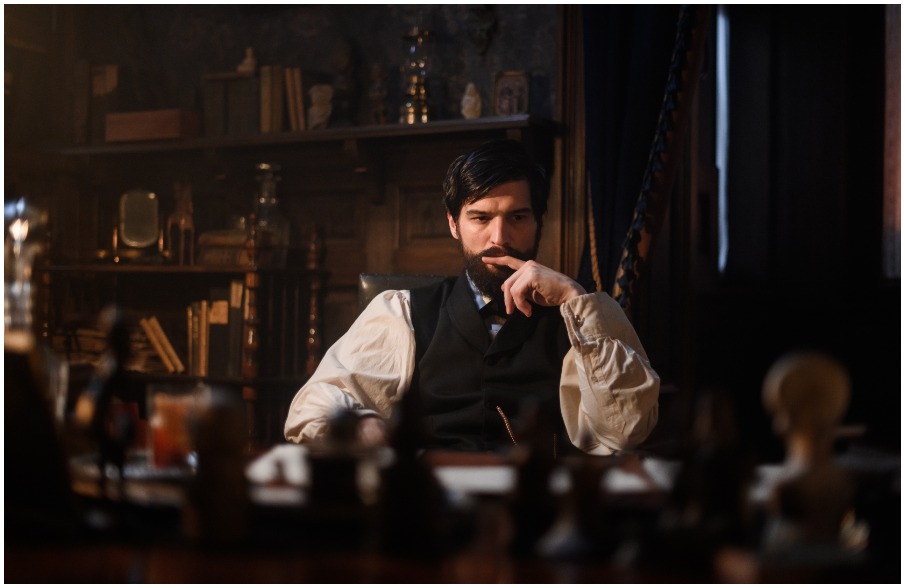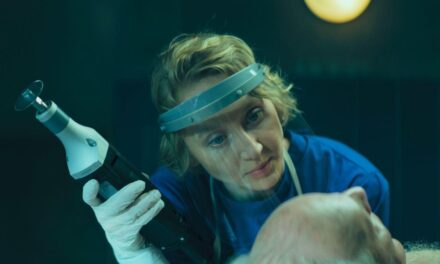
Freud, Netflix’ Austrian series, features the young Sigmund Freud (Robert Finster) in 1880’s Vienna trying to establish hypnosis as a serious psychiatric discipline and failing. When the body of a prostitute is delivered to his office by police, Freud is launched into an investigation that may link back to séances led by the mysterious Hungarian nobles Szapáry, featuring the beautiful medium, Fleur Salomé (Ella Rumpf). Is it possible that these gruesome murders can help him prove his theories about hypnosis?
Hypnosis and Occult
It’s 1886 in Vienna. Sigmund Freud is trying to make his name as a neurologist working with the mentally ill. In spite of, or perhaps because of, his cocaine addiction, Freud is maniacally determined to prove that mental illness is more than just physical disturbances in the brain, as was the belief of the day. Eschewing contemporary techniques such as driving out madness by causing a high fever in patients, Freud attempts to use hypnosis to access patients’ unconscious mind, thus revealing the true cause of their afflictions. When we meet Freud, he is the laughing stock of his colleagues. In an attempt to cheer him up, a friend takes Freud to a séance at the mansion of dashing Hungarian Count Viktor Szapáry (Philipp Hochmair). What starts as a bogus ceremony to raise the dead quickly turns real when the medium, Fleur Salomé (Ella Rumpf), witnesses something during her trance that causes a seizure. Freud is intrigued, and even more so when Fleur seeks his help in understanding what she is seeing and why.
Murder makes strange bedfellows
Meanwhile, police inspectors Kiss (Georg Friedrich) and Poschacher (Christoph F. Krutzler) are called to a brothel where a prostitute has been stabbed and left for dead. They rush her to the nearest doctor-Sigmund Freud. At first, this murder seems unrelated to the Hungarian séances, but not for long. Soon Freud and the inspectors become allies in trying to find the killer. Eventually, the case reaches the highest echelon of society, and politics come into play. Turns out the Hungarians are trying to ingratiate themselves into the court of Franz Joseph I using powers of the occult, and it is up to Freud and the inspectors to figure out how the murders fit into this nefarious scheme.
History in Freud
It helps to know some history before watching Freud on Netflix. In the show, Sigmund Freud is a young neurologist working at a mental hospital in Vienna under the esteemed professor Theodore Meynert (Rainer Bock), trying, and failing, to prove his theory that hypnosis is a legitimate tool to treat the mentally ill. This part is true. Freud was a student of Reynert, who did distance himself from Freud because of Freud’s “outlandish” theories. Another part of Freud that is true is that Hungary was a rebellious part of the Austrian empire. Under Franz Josef I (Habsburg), in order to quell rebellion and keep the peace, Austria and Hungary established a treaty in 1867 stating that Austria and Hungary were to be co-monarchies, with Franz Josef as both the Emperor of Austria and the King of Hungary. In the show, the Hungarian count and countess Szapáry are angling to be accepted into the court of Franz Josef, but we don’t know to what end-compliance or rebellion? While Sophia (Anja Kling) and Viktor Szapáry are fictional characters, Hungarian nationalists working to infiltrate the Austrian court most certainly existed.
Our Review of Freud on Netflix
Freud on Netflix is gripping and complex, with the extra treat of having historical facts woven into what is clearly a fictional tale. Adding the occult and gruesome murders to Freud’s history is a great concept, and the story ties it into his theories of hypnosis nicely. Creator Martin Kren (4 Blocks, Tatort) didn’t have to put a geopolitical spin on the tale, yet I’m glad he did. But I could have used some more humor. In this show, Freud is utterly humorless. Maybe he was in real life too, but it’s a bummer when your main character is one dimensional. For that reason, the character of Lenore (Brigitte Kren), Freud’s sardonic housekeeper, is a boon. Ella Rumpf, who plays Fleur, is the breakout star here. Freud is definitely worth watching, but it lacks the eerie atmosphere of Dark or endearing kookiness of Babylon Berlin.
Looking for more of the best in foreign TV? Don’t miss our other great reviews HERE!





